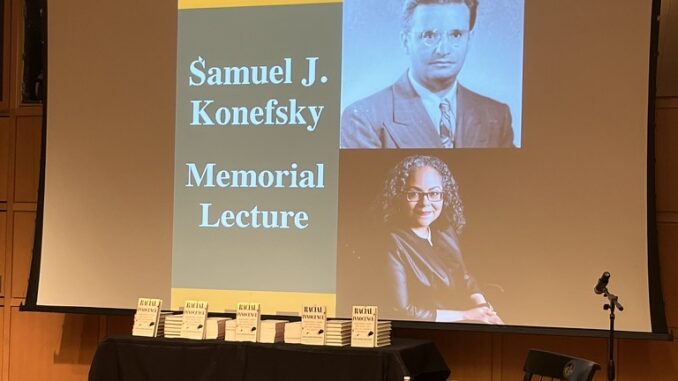
By Rami Mansi
In a collaborative effort by various Brooklyn College programs, the 2024 Konefsky Memorial Lecture, “Understanding Latinx Anti-Blackness Through the Lens of Equality Law,” took place on Oct. 16. Led by Tanya Kateri Hernandez, a professor of law at Fordham University and internationally acclaimed comparative race law expert, the talk delved into the growing anti-Black sentiment and violence from the Latinx community, systematic racism within an already segregated community, and the rhetoric of racial innocence.
The Konefsky Memorial Lecture is a series of annual speeches honoring the late Samuel J. Konefsky, a valued alum and constitutional law professor from the 1940s and 1970s. The lecture was paired with the annual Samuel J. Konefsky Memorial Award, awarded this year to Milada Sirota, a political science major at BC. With small introductions by dean Gaston Alonso of the Wolfe Institute, President Michelle Anderson, and BC Professor Anna Law, Hernandez then began her lecture discussing the challenges in racial justice.
“An important challenge in racial justice that often gets overlooked is the anti-Black bias that exists in communities themselves considered ethnic and racial minorities,” said Hernandez. “Exploring Latino complicity in anti-Blackness seems like a puzzle in constitutional law.”
Hernandez discussed how certain members of the Latinx community have taken up arms with fellow white supremacist groups, to portray and act on anti-Black motives, proven by numerous photographs, documented criminals, and studies shown throughout the lecture. One example brought up by Hernandez was Enrique Tarrio, a Latino man who was given 22 years in prison for his critical role as a chairman of the white supremacist group Proud Boys in the Jan. 6 attack. Hernandez said that being a part of a marginalized community does not make you immune from perpetrating racist ideals or being discriminatory yourself.
“Examining how anti-blackness does still manage to manifest itself among the racially mixed rainbow of Latinos […] is a powerful illustration of how people of color themselves can fortify racism,” stated Hernandez.
People shield their racism under their identity, claiming that they cannot be anti-Black because they are from a marginalized community. This notion has been coined by Hernandez as “racial innocence.” In her newest book on the subject, “Racial Innocence: Unmasking Latino Anti-Black Bias and the Struggle for Equality,” Hernandez seeks to “challenge and transform our conversations about race.”
Hernandez used multiple court cases to support her thesis, such as the cases of Eddie Fraiser, Maxine Sprott, and Jose Arrooha. These cases showed that racial diversity within an environment was used as the main argument that racial discrimination and colorism were not taking place. This discrimination of Latino anti-Blackness was also found in the case of Hunt v. Personal Staffing Group, where employers were creating segregated workforces within an already cast system between Mexican and African American workers.
Hernandez also explained that this structural change needs to begin at the college level. Students have to be made aware of anti-Blackness as future leaders and change-makers in society.
“Our college students are our political future,” said Hernandez. “We need for our university settings to be responsible in making sure [students] get the education they need for the world they are going to be living in.”
Additionally, to fight this ongoing bias, Hernandez stated that structural change needs to happen in many different realms across U.S. society in order to stop anti-Blackness. This begins by first becoming educated about the many forms racism can take.
“Dismantling racism in the US, requires every component of our structures be taken apart,” stated Hernandez. “We do this by becoming radically literate about Latino anti-Blackness and engaging in meaningful work.”
